Black cop!! Black cop Black cop Black cop
Stop shootin Black people, we all gonna drop
You don’t even get, paid a whole lot
So take your M-60 and put it ‘pon lock!
Take your four-five and you put it ‘pon lock!
Lookin for your people when you walk down a block
Here in America you have drug spot
They get the Black cop, to watch the drug spot
The Black drug dealer just avoid Black cop
They’re killin each other on a East Coast block
Killin each other on a West Coast block
White police, don’t give a care about dat
Dem want us killin each other over crack
Anyway you put it it’s a Black on BLACK …
Black cop!! Black cop Black cop …
Thirty years, there were no Black cops
You couldn’t even run, drive round the block
Recently police trained Black cop
To stand on the corner, and take gunshot
This type of warfare isn’t new or a shock
It’s Black on Black crime again nonSTOP
Black cop!! Black cop Black cop …
Here’s what the West and the East have in common
Both have Black cops in cars profilin
Hardcore kids in the West got stress
In the East we are chased by the same black beast
The Black cop is the only real obstacle
Black slave turned Black cop is not logical
But very psychological, haven’t you heard?
It’s the BLACK COP killin Black kids in Johannesburg
Whassup Black cop, yo, whassup?!
Your authorization says shoot your nation
You want to uphold the law, what could you do to me?
The same law dissed the whole Black community
You can’t play both sides of the fence
1993 mad kids are gettin tense
Black cop!! Black cop Black cop Black cop
Stop shootin Black people we all gonna drop
You don’t even get, paid a whole lot
Take your four-five and you put it ‘pon lock!
Take your M-60 and put it ‘pon lock!
Take your uzi, put it ‘pon lock!
Black cop Black cop Black cop
— from Boogie Down Productions – “Black Cop”
Many of us were heavily traumatized by the graphic video of five Memphis police officers beating Tyre Nichols to death as he cried out for his mother. After years of recent high profile police killings of Afrikan Americans that started to gain worldwide attention with the killings of Michael Brown, Tamir Rice and Trayvon Martin and the resultant Movement for Black Lives, perhaps some of us had become numb to these atrocities. For those of you who became so inured to this that you fell asleep, here is your wake up call. Again.
Police body camera video (the ones that were actually turned on) showed police cursing at Mr. Nichols as they violently snatched him from his car immediately upon making the stop, a clear indication of immediate and unprovoked excessive force. This is what it has come to. The fact that the police were wearing body cameras that would supposedly record their actions apparently meant nothing to them. These police officers clearly seemed to be acting on the assumption of their own impunity and displayed no awareness of the atrocity they were committing or even of the trouble they should be in as a direct result of their actions. Pose for a selfie while you’re at it, fellas.
The limitation of body cameras was shown not only in the fact that they did not prevent this behavior on the part of the Memphis police or the fact that several of the cameras were conveniently turned off during parts of the altercation, but also the fact that the pole-mounted video camera provided key visual evidence the body cameras could not. That camera, mounted high on a lamp post, provided a wide-angle view that clearly showed several officers holding Mr. Nichols, who was already slumped over, barely conscious and not resisting, in an upright position so some of the officers could take turns kicking him and striking him with fists and batons.
According to the video evidence, not one of the five main defendants nor the other police officers who ultimately responded to the scene tried to stop the beating. There was no timely call for medical attention, and the medical personnel who did respond also failed to provide timely care to Mr. Nichols. Many, if not all, of the involved parties have been fired or disciplined, though it is unclear if any charges will be made against them. So much for protect and serve.
Some people were quick to point out that these were Black police officers dispensing this brutal “street justice” upon a Black motorist. This argument is what some analysts would refer to as a “red herring”. Police brutality has always been not so much about the race of the officers as about the race or economic standing of the victim (Black or Brown or poor). While the results from studies of the effect of Black police officers on reducing discretionary stops, harassment of citizens and acts of brutality are mixed, some critics have pointed out that Black police can sometimes be more violent against Black suspects than their White coworkers, perhaps out of overzealousness to “clean up the community” or even an effort to prove that they perceive their color as “Blue” and not “Black”.
Even so, there have been Black police officers who have spoken out against police brutality in their community. Many of them have paid a price for their honesty, forthrightness, honor and activism. Back in the mid to late 1990s, I had the opportunity to meet Dr. DeLacy Davis, then a Sergeant in the East Orange, New Jersey police department and the founder of Black Cops Against Police Brutality, several times as he was attending community meetings in Philadelphia, New York and Baltimore to discuss the issue of police brutality and misconduct. His activism led to harassment, assaults and death threats — from police. He participated in the town hall meetings that were held by the Rev. Walter Fauntroy and Martin Luther King III in the summer and fall of 1999 to bring attention to the issue, as documented in several reports at the time, including KUUMBAReport Newsletter, available here:
Support Your Local Sheriff?: Report on the SCLC’s Hearings on Police Brutality, KUUMBAReport, August-September 1999
https://kuumbareport.com/wp-content/uploads/2013/05/KuumbaReport-12-August-September-1999-Support-Your-Local-Sherriff-PDF.pdf
Dr. Davis still advocates against police brutality, and his work can be followed through his Web site, https://drdelacydavis.com/.
Other efforts to combat police brutality, corruption, racism and abuse include The Marshall Project, https://www.themarshallproject.org/. Other articles pertaining to the Tyre Nichols case, police brutality in general and efforts to stop it are included in the links at the end of this article. One article in particular is the following:
Tyre Nichols’ Death: How Black Officers Alone Can’t Stop Brutal Policing – The Marshall Project
https://www.themarshallproject.org/2023/01/28/tyre-nichols-memphis-black-police-brutality
And now, we can expect more hand-wringing and excuses over the issue of police brutality. Once again, politicians are going to be concerned about “violence in the streets” in response to this violence in the street. Right wing “conservative” pundits will express concerns about impending new calls to defund the police. And police officers themselves will no doubt be on higher alert for individuals who may choose to vent their rage against law enforcement by targeting police officers themselves for violence. Police brutality and misconduct not only endangers the citizenry. It endangers those police officers who actually do take their responsibility seriously and do their jobs with a degree of honor and integrity. But the failure of police leadership, including the police unions, and the politicians who unconditionally back every misdeed of law enforcement personnel, to rein in police abuse, racism, corruption and violence, endangers all police, including the truly dedicated ones who joined the force to serve their community.
The Legacy and Life of Keona Holley, Baltimore Police Officer Targeted by Violence
https://www.facebook.com/59109969606/posts/pfbid022esH3ZdGkDFgBU8e1ANpgwocXBuPGgNXNM6iQqUDNtctjuSpSFciA5KqPn7RApu5l/?sfnsn=mo&mibextid=6aamW6
The usual “suspects” will come forward with the usual arguments in an attempt to explain or even justify police misconduct. Analysts will again pose the question: where did their training go wrong? I have stated on several occasions that police brutality is not a training issue: training imparts a knowledge or a skill; it does not build character or morality. As someone who has 30 years of experience in both employee recruitment & selection and employee training, I have often stated that this is an issue of selecting bad people to be cops and failing to correct bad behavior through progressive discipline before it becomes catastrophic, not an issue of how well these officers were trained.
But then again, maybe it is a training issue. If that is the case and the training of police is the problem, it could be that often police were too well trained: trained in how to plant evidence, trained in how to falsely set the tone for a defense in court (repeatedly yelling “Give me your hands” a total of 71 times in 13 minutes as the video was running, making statements such as “he tried to take my gun” and speculating that “he must be on something” for the body camera video), trained in how to deactivate several of the body cameras at the appropriate time, trained in what to say in court in an effort to escape criminal prosecution (such as “we feared for our lives”, “he was clearly on drugs”, “he was driving recklessly”, “he tried to take my gun”). In short, trained in how to successfully blame the victim.
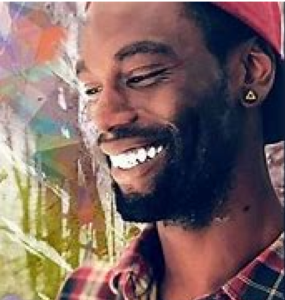 The police apologists will once again insist that “these are just a few bad apples” and that “99.9 percent of police do their jobs honorably and with respect for citizens.” How is it, then, that people of Afrikan descent seem to so often encounter that 0.1 percent of police who are violent, corrupt and racist? How was Oscar Grant killed while he was handcuffed, face down, on a Bay Area Rapid Transit platform as he was telling his friends to comply with police? How was Philando Castille gunned down in his own car, in front of his lady and their child, for politely informing the officer that he was in legal possession of a firearm according to Minnesota’s gun laws? How do we wind up with cases such as those of Abner Louima (who survived being sodomized in 1997 by four New York police officers in a precinct bathroom), Amadou Diallo (who was shot 19 times and killed February 4, 1999 — 24 years ago practically to the day — by plainclothes police for entering the apartment building where he lived), Breonna Taylor (killed in her sleep in a hail of bullets), Sandra Bland (killed in a jail cell after a bogus traffic stop), Tamir Rice (killed for playing with a toy gun alone in a park), John Crawford III (killed for shopping in the gun aisle at an Ohio Walmart), Elijah McClain (injected with ketamine and killed by officers who accosted him for Walking While Black) — and these are just some of the victims who never posed any threat to police and were not even breaking the law — and so many others? How was Ronald Madison, a 45-year-old developmentally disabled man, shot multiple times in New Orleans in the wake of Hurricane Katrina by a police unit that then tried to cover up their crime by claiming he was a violent drug dealer who shot at them first? How was Rayshard Brooks shot in the back as he was running from police in an Atlanta, Georgia fast-food drive-thru? How was Walter Scott shot in the back in North Charleston, South Carolina as he was running from a police officer? How did we end up with Eric Garner being strangled with an illegal chokehold on a New York City street by Daniel Pantaleo and over half a dozen other police as he cried “I can’t breathe” and George Floyd’s throat being crushed by Derek Chauvin and three other Minneapolis police as he begged for his life? How did Freddie Gray end up dying from a broken neck for simply running from Baltimore City police when they stared at him? And now, how did five Memphis police get it into their heads to beat Tyre Nichols literally to death? No, these are not just a few bad apples. To paraphrase a 1990 commentary about racist right-wing politicians by Dr. Julianne Malveaux, this is five rotten apples that have not fallen far from a rotting tree.
The police apologists will once again insist that “these are just a few bad apples” and that “99.9 percent of police do their jobs honorably and with respect for citizens.” How is it, then, that people of Afrikan descent seem to so often encounter that 0.1 percent of police who are violent, corrupt and racist? How was Oscar Grant killed while he was handcuffed, face down, on a Bay Area Rapid Transit platform as he was telling his friends to comply with police? How was Philando Castille gunned down in his own car, in front of his lady and their child, for politely informing the officer that he was in legal possession of a firearm according to Minnesota’s gun laws? How do we wind up with cases such as those of Abner Louima (who survived being sodomized in 1997 by four New York police officers in a precinct bathroom), Amadou Diallo (who was shot 19 times and killed February 4, 1999 — 24 years ago practically to the day — by plainclothes police for entering the apartment building where he lived), Breonna Taylor (killed in her sleep in a hail of bullets), Sandra Bland (killed in a jail cell after a bogus traffic stop), Tamir Rice (killed for playing with a toy gun alone in a park), John Crawford III (killed for shopping in the gun aisle at an Ohio Walmart), Elijah McClain (injected with ketamine and killed by officers who accosted him for Walking While Black) — and these are just some of the victims who never posed any threat to police and were not even breaking the law — and so many others? How was Ronald Madison, a 45-year-old developmentally disabled man, shot multiple times in New Orleans in the wake of Hurricane Katrina by a police unit that then tried to cover up their crime by claiming he was a violent drug dealer who shot at them first? How was Rayshard Brooks shot in the back as he was running from police in an Atlanta, Georgia fast-food drive-thru? How was Walter Scott shot in the back in North Charleston, South Carolina as he was running from a police officer? How did we end up with Eric Garner being strangled with an illegal chokehold on a New York City street by Daniel Pantaleo and over half a dozen other police as he cried “I can’t breathe” and George Floyd’s throat being crushed by Derek Chauvin and three other Minneapolis police as he begged for his life? How did Freddie Gray end up dying from a broken neck for simply running from Baltimore City police when they stared at him? And now, how did five Memphis police get it into their heads to beat Tyre Nichols literally to death? No, these are not just a few bad apples. To paraphrase a 1990 commentary about racist right-wing politicians by Dr. Julianne Malveaux, this is five rotten apples that have not fallen far from a rotting tree.
So, what is the tree’s root?
This is part of the Slave Patrol legacy, that group of vigilantes who were dispatched to apprehend runaway slaves and who, along with the Pinkertons who crushed worker strikes on behalf of their corporate employers, were a major part of the genesis of the modern-day police force.
On a more contemporary level, the current apparent upsurge in police murders of unarmed civilians is a result, in part, of the culture wars that have been stoked for decades (and actually longer than that, but people’s memories are short, and who has time to read history anyway?) by right-wing, law-and-order, police-are-always-right politicians and media pundits who have refused to hear the cries of police brutality victims since before the Black Panther Party started calling attention to these atrocities in the Sixties.
This is also police paranoia and police gang mentality, bolstered by the “Thin Blue Line” and an “us versus them” mentality among too many cops, and further fueled by the unspoken but often-demonstrated attitude that police not only enforce the law, they are above it as well. That mentality was only encouraged and amplified by the glorification of Special Weapons And Tactics (SWAT) and Police Paramilitary Units (PPUs), so-called “elite” units who were provided with military-grade weaponry, provided with simulated urban-warfare training centers (like the one in Atlanta that has been the target of guerilla-style protests by environmentalists and critics of increased police power) and granted broad authority to enforce order, often however they saw fit. This is where units like Memphis’s SCORPION (“Street Crimes Operation to Restore Peace In Our Neighborhoods”), the Baltimore Gun Trace Task Force and Red Squad, and so many other “elite” police units derived much of their authority and discretion, which they exploited to empower them to commit acts of violence such as this.
How will this latest act of police brutality impact “The Talk” that so many of us have felt the need to have with our children, especially our young men? How will this impact the recommended strategy of compliance and non-resistance with police who may abuse and kill you anyway? What impact will this have on building a more revolutionary Pan-Afrikanist agenda within the Black community, particularly in those cities and neighborhoods where police already had a strained relationship with the people?
And how much harder will it make the jobs of those who actually do become police officers out of what some might regard as a naive commitment to do good for their community?
These questions are often difficult to answer, but one thing is certain.
As long as we continue to react to these atrocities instead of proactively organizing the activists of our community, our oppressors and enemies will continue to tolerate, cover up, ignore, encourage, defend, approve, plan and personally commit these heinous acts. Our continued dis-organization and collective in-action expresses, in an activist context, what Dr. King described on a personal level: “There comes a time when silence is betrayal.” (from Beyond Vietnam: A Time to Break the Silence, April 4, 1967) We must begin to truly organize as a people, and it must start with our activists, organizers and self-described leaders. And it must start now. No more egos, no more “you must follow me”, no more ideological rigidity and arrogance. Start talking to each other and planning together or get used to seeing more and more of atrocities like this.
Some links to related articles about Black victims of police brutality
Black Atlantans Terrorized by Memphis Police Speak Out: “They’d Beat Your Ass”
https://www.msn.com/en-us/news/other/black-atlantans-terrorized-by-memphis-pd-chief-s-old-unit-speak-out-they-d-beat-your-ass/ar-AA175ksR
Full List of 229 Black People Killed by Police Since George Floyd’s Murder
https://www.newsweek.com/full-list-229-black-people-killed-police-since-george-floyds-murder-1594477
Know Their Names: Al Jazeera
https://interactive.aljazeera.com/aje/2020/know-their-names/index.html
Tyre Nichols Beating Raises Scrutiny on Elite Police Units
https://www.msn.com/en-us/news/us/tyre-nichols-beating-raises-scrutiny-on-elite-police-units/ar-AA16XQaJ?ocid=msedgntp&cvid=8d91eadaadc24dae8c23667120850a31
Opinion: The Deplorable Reason Memphis Police Stopped Tyre Nichols
https://www.msn.com/en-us/news/us/opinion-the-deplorable-reason-memphis-police-stopped-tyre-nichols/ar-AA16XWCI?ocid=msedgntp&cvid=370ab24232f544188e6432e5900eea0a
MSN: Memphis cops reportedly gave Tyre Nichols 71 commands in 13 minutes: ‘So far out of the norm’
https://www.msn.com/en-us/news/crime/memphis-cops-reportedly-gave-tyre-nichols-71-commands-in-13-minutes-so-far-out-of-the-norm/ar-AA16WxLb?ocid=msedgntp&cvid=8d91eadaadc24dae8c23667120850a31
MSN: Double amputee, 36, shot dead after attempting to run away from cops
https://www.msn.com/en-us/news/crime/double-amputee-36-shot-dead-after-attempting-to-run-away-from-cops/ss-AA16XqQX?ocid=msedgntp&cvid=8d91eadaadc24dae8c23667120850a31#image=2
MSN: Memphis police seen beating another Black man and forcing his face to the ground, while detaining him [VIDEO]
https://www.msn.com/en-us/news/crime/memphis-police-seen-beating-another-black-man-and-forcing-his-face-to-the-ground-while-detaining-him-video/ar-AA16Zsou?ocid=msedgntp&cvid=10ed80a77022425aa171e7694cfed8ce
Nichols Death Proves Elite Police Units Are A Disaster: Real Clear Policy
https://www.realclearpolicy.com/2023/01/30/tyre_nichols_death_proves_elite_police_units_are_a_disaster_878531.html
“Elite” Police Units Face More Scrutiny as Memphis SCORPION Unit Disbanded over Tyre Nichols Death: DemocracyNow!
https://www.democracynow.org/2023/1/31/radley_balko_warrior_cops_elite_units
Do ‘elite’ police teams like Memphis’ SCORPION unit do more harm than good?: On Point
https://www.wbur.org/onpoint/2023/02/01/specialized-police-units-tyre-nichols
Opinion: Tyre Nichols’s Death Proves Yet Again That ‘Elite’ Police Units Are a Disaster – The New York Times
https://www.nytimes.com/2023/01/29/opinion/tyre-nichols-police-scorpion.html
Memphis SCORPION Unit Deactivated
https://www.msn.com/en-us/news/crime/tyre-nichols-live-updates-scorpion-unit-permanently-deactivated/ar-AA16O2sg?ocid=winp1taskbar&cvid=0c5f1ce054814fbbae9d20cbe5265857
Memphis man says he was assaulted by same Scorpion officers charged with Tyre Nichols’ death
https://www.nbcnews.com/news/us-news/memphis-man-says-was-assaulted-scorpion-officers-charged-tyre-nichols-rcna68860
What Tyre Nichols’ Death Reminds Us About Black Suffering: Medicine’s racist history bleeds into today’s medical practices, by Mengyi “Zed” Zha, MD February 2, 2023
https://www.medpagetoday.com/popmedicine/popmedicine/102934?xid=nl_popmed_2023-02-03&eun=g1701093d0r&utm_source=Sailthru&utm_medium=email&utm_campaign=PopMedicine_020323&utm_term=NL_Gen_Int_PopMedicine_Active
The Legacy and Life of Keona Holley, Baltimore Police Officer Targeted by Violence
https://www.facebook.com/59109969606/posts/pfbid022esH3ZdGkDFgBU8e1ANpgwocXBuPGgNXNM6iQqUDNtctjuSpSFciA5KqPn7RApu5l/?sfnsn=mo&mibextid=6aamW6
Remembering Officer Keona Holley: Baltimore officer ambushed, shot in patrol car a year ago December 16, 2022, CBS Baltimore
https://www.cbsnews.com/baltimore/news/remembering-officer-keona-holley-baltimore-officer-ambushed-shot-in-patrol-car-a-year-ago/
Why Diversity Hasn’t changed Policing – Christian Science Monitor
https://www.csmonitor.com/USA/Society/2023/0203/Why-diversity-hasn-t-changed-policing
How common are killings by police? How often are officers prosecuted?
https://www.csmonitor.com/USA/Justice/2023/0202/How-common-are-killings-by-police-How-often-are-officers-prosecuted?icid=mkt:web:exitd-related
Tyre Nichols’ Death: How Black Officers Alone Can’t Stop Brutal Policing – The Marshall Project
https://www.themarshallproject.org/2023/01/28/tyre-nichols-memphis-black-police-brutality
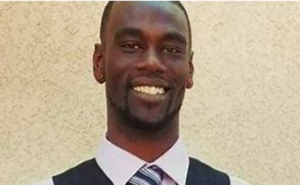
Like this:
Like Loading...
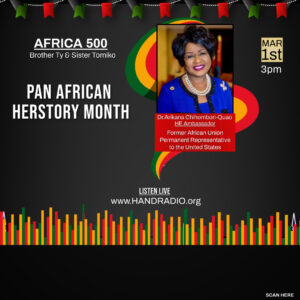

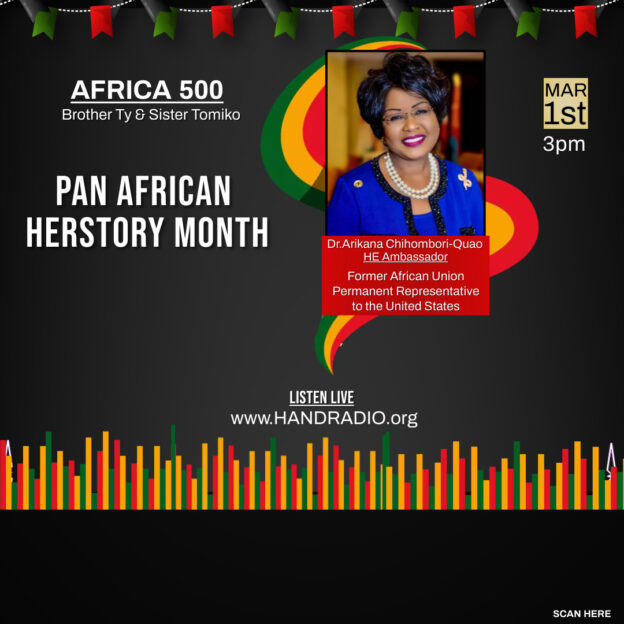
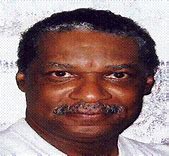
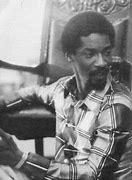 murdering a Baltimore City police officer and seriously injuring another. Despite Baba Eddie’s protestation of innocence and a lack of any physical evidence linking him to the case, he was convicted and sentenced to life in prison. It was in prison, at the Maryland House of Correction in Jessup, Maryland, not-so-affectionately known as “The Cut”, that I met Baba Eddie. I had talked with him over the phone a couple of times, and I was at “The Cut” specifically to meet him and be introduced to the Writers’ Club, a group of inmates who used prose, poetry and other literary pursuits to help them heal their psyches and, for those who could look forward to release one day, prepare them to better cope with the world outside. I was impressed with the calm that Baba Eddie exuded, and I wrote about my encounter with him in the newsletter I was writing at the time (
murdering a Baltimore City police officer and seriously injuring another. Despite Baba Eddie’s protestation of innocence and a lack of any physical evidence linking him to the case, he was convicted and sentenced to life in prison. It was in prison, at the Maryland House of Correction in Jessup, Maryland, not-so-affectionately known as “The Cut”, that I met Baba Eddie. I had talked with him over the phone a couple of times, and I was at “The Cut” specifically to meet him and be introduced to the Writers’ Club, a group of inmates who used prose, poetry and other literary pursuits to help them heal their psyches and, for those who could look forward to release one day, prepare them to better cope with the world outside. I was impressed with the calm that Baba Eddie exuded, and I wrote about my encounter with him in the newsletter I was writing at the time (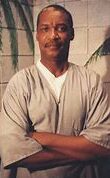 known as Jericho, which advocated for the hundreds of Political Prisoners being held in penitentiaries, prisons and jails in the US, from Mumia Abu-Jamal and MOVE in Philadelphia, to Indigenous First Nations Political Prisoner Leonard Peltier and the American Indian Movement (AIM), to White Political Prisoners such as Thomas Manning and Marilyn Buck, to Panthers imprisoned across the country that included Dr. Mutulu Shakur, Sundiata Acoli, Romaine “Chip” Fitzgerald, Veronza Bowers, Hugo “Yogi” Pinnell, Wopashitwe Mondo Eyen we Langa and Ed Poindexter, to exiles such as Assata Shakur, and of course to Baba Eddie.
known as Jericho, which advocated for the hundreds of Political Prisoners being held in penitentiaries, prisons and jails in the US, from Mumia Abu-Jamal and MOVE in Philadelphia, to Indigenous First Nations Political Prisoner Leonard Peltier and the American Indian Movement (AIM), to White Political Prisoners such as Thomas Manning and Marilyn Buck, to Panthers imprisoned across the country that included Dr. Mutulu Shakur, Sundiata Acoli, Romaine “Chip” Fitzgerald, Veronza Bowers, Hugo “Yogi” Pinnell, Wopashitwe Mondo Eyen we Langa and Ed Poindexter, to exiles such as Assata Shakur, and of course to Baba Eddie.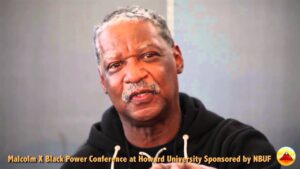 revolutionary activism of his youth, but he continued to work on behalf of the rights of the people and the truth. He began working at The Real News in Baltimore (
revolutionary activism of his youth, but he continued to work on behalf of the rights of the people and the truth. He began working at The Real News in Baltimore (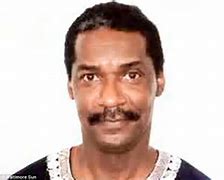 Below are several links to just a few of the articles, videos and podcasts that have been produced to pay tribute to Baba Eddie:
Below are several links to just a few of the articles, videos and podcasts that have been produced to pay tribute to Baba Eddie: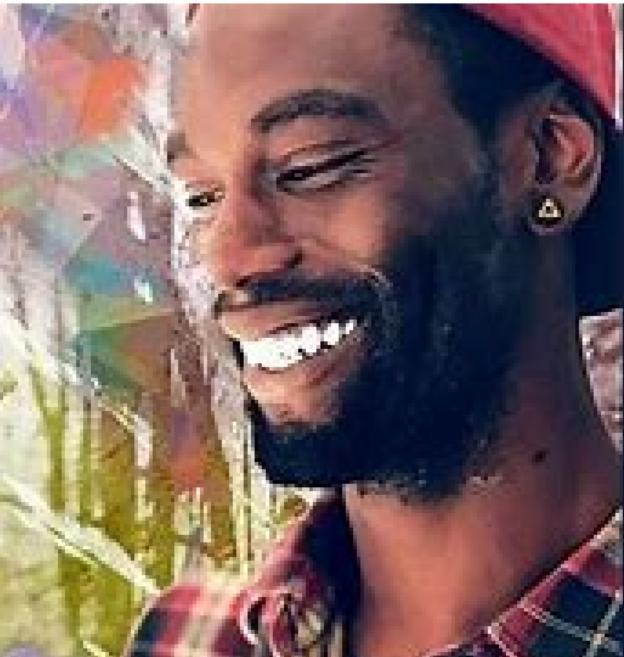
 The police apologists will once again insist that “these are just a few bad apples” and that “99.9 percent of police do their jobs honorably and with respect for citizens.” How is it, then, that people of Afrikan descent seem to so often encounter that 0.1 percent of police who are violent, corrupt and racist? How was Oscar Grant killed while he was handcuffed, face down, on a Bay Area Rapid Transit platform as he was telling his friends to comply with police? How was Philando Castille gunned down in his own car, in front of his lady and their child, for politely informing the officer that he was in legal possession of a firearm according to Minnesota’s gun laws? How do we wind up with cases such as those of Abner Louima (who survived being sodomized in 1997 by four New York police officers in a precinct bathroom), Amadou Diallo (who was shot 19 times and killed February 4, 1999 — 24 years ago practically to the day — by plainclothes police for entering the apartment building where he lived), Breonna Taylor (killed in her sleep in a hail of bullets), Sandra Bland (killed in a jail cell after a bogus traffic stop), Tamir Rice (killed for playing with a toy gun alone in a park), John Crawford III (killed for shopping in the gun aisle at an Ohio Walmart), Elijah McClain (injected with ketamine and killed by officers who accosted him for Walking While Black) — and these are just some of the victims who never posed any threat to police and were not even breaking the law — and so many others? How was Ronald Madison, a 45-year-old developmentally disabled man, shot multiple times in New Orleans in the wake of Hurricane Katrina by a police unit that then tried to cover up their crime by claiming he was a violent drug dealer who shot at them first? How was Rayshard Brooks shot in the back as he was running from police in an Atlanta, Georgia fast-food drive-thru? How was Walter Scott shot in the back in North Charleston, South Carolina as he was running from a police officer? How did we end up with Eric Garner being strangled with an illegal chokehold on a New York City street by Daniel Pantaleo and over half a dozen other police as he cried “I can’t breathe” and George Floyd’s throat being crushed by Derek Chauvin and three other Minneapolis police as he begged for his life? How did Freddie Gray end up dying from a broken neck for simply running from Baltimore City police when they stared at him? And now, how did five Memphis police get it into their heads to beat Tyre Nichols literally to death? No, these are not just a few bad apples. To paraphrase a 1990 commentary about racist right-wing politicians by Dr. Julianne Malveaux, this is five rotten apples that have not fallen far from a rotting tree.
The police apologists will once again insist that “these are just a few bad apples” and that “99.9 percent of police do their jobs honorably and with respect for citizens.” How is it, then, that people of Afrikan descent seem to so often encounter that 0.1 percent of police who are violent, corrupt and racist? How was Oscar Grant killed while he was handcuffed, face down, on a Bay Area Rapid Transit platform as he was telling his friends to comply with police? How was Philando Castille gunned down in his own car, in front of his lady and their child, for politely informing the officer that he was in legal possession of a firearm according to Minnesota’s gun laws? How do we wind up with cases such as those of Abner Louima (who survived being sodomized in 1997 by four New York police officers in a precinct bathroom), Amadou Diallo (who was shot 19 times and killed February 4, 1999 — 24 years ago practically to the day — by plainclothes police for entering the apartment building where he lived), Breonna Taylor (killed in her sleep in a hail of bullets), Sandra Bland (killed in a jail cell after a bogus traffic stop), Tamir Rice (killed for playing with a toy gun alone in a park), John Crawford III (killed for shopping in the gun aisle at an Ohio Walmart), Elijah McClain (injected with ketamine and killed by officers who accosted him for Walking While Black) — and these are just some of the victims who never posed any threat to police and were not even breaking the law — and so many others? How was Ronald Madison, a 45-year-old developmentally disabled man, shot multiple times in New Orleans in the wake of Hurricane Katrina by a police unit that then tried to cover up their crime by claiming he was a violent drug dealer who shot at them first? How was Rayshard Brooks shot in the back as he was running from police in an Atlanta, Georgia fast-food drive-thru? How was Walter Scott shot in the back in North Charleston, South Carolina as he was running from a police officer? How did we end up with Eric Garner being strangled with an illegal chokehold on a New York City street by Daniel Pantaleo and over half a dozen other police as he cried “I can’t breathe” and George Floyd’s throat being crushed by Derek Chauvin and three other Minneapolis police as he begged for his life? How did Freddie Gray end up dying from a broken neck for simply running from Baltimore City police when they stared at him? And now, how did five Memphis police get it into their heads to beat Tyre Nichols literally to death? No, these are not just a few bad apples. To paraphrase a 1990 commentary about racist right-wing politicians by Dr. Julianne Malveaux, this is five rotten apples that have not fallen far from a rotting tree.
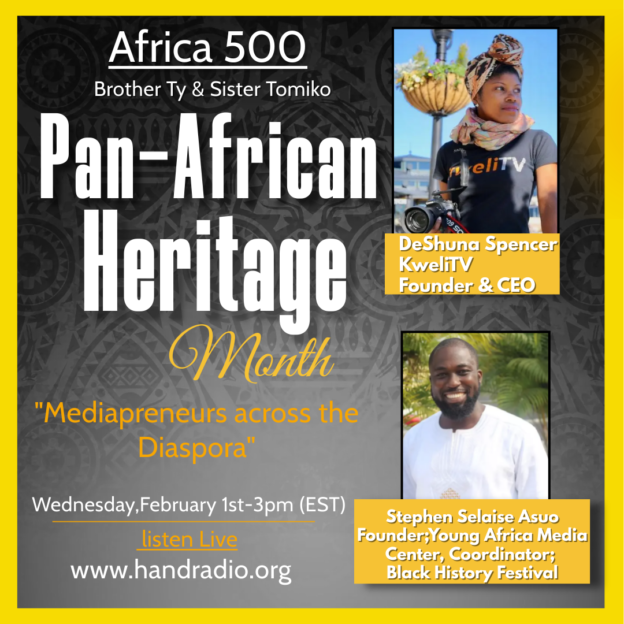
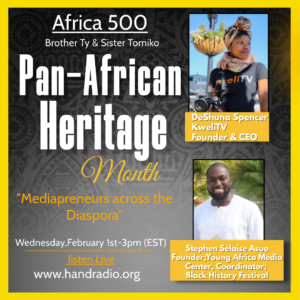 The February 1, 2023 edition of Africa 500 features guests DeShuna Spencer of KweliTV and Stephen Selaise Asuo of Young Africa Media Center and YALI TV.
The February 1, 2023 edition of Africa 500 features guests DeShuna Spencer of KweliTV and Stephen Selaise Asuo of Young Africa Media Center and YALI TV.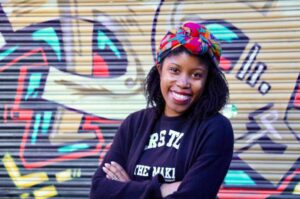
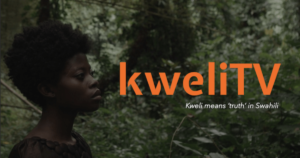 As a former journalist & radio host, DeShuna’s work focuses on the intersection of media images and implicit bias. She speaks frequently on media representation, diversity in the streaming & the OTT space, social entrepreneurship, the effects of Black trauma content, challenges & opportunities in the media landscape, starting a media tech venture, women in media & tech, and her journey as a Black founder.
As a former journalist & radio host, DeShuna’s work focuses on the intersection of media images and implicit bias. She speaks frequently on media representation, diversity in the streaming & the OTT space, social entrepreneurship, the effects of Black trauma content, challenges & opportunities in the media landscape, starting a media tech venture, women in media & tech, and her journey as a Black founder.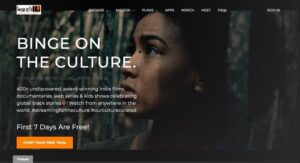 Being a niche streaming player is never easy, and the list of failed ventures is long. But as major streaming services become more expensive, bloated, and cumbersome to navigate, it may create an opportunity for smaller companies with a more specific point of view–KweliTV among them.
Being a niche streaming player is never easy, and the list of failed ventures is long. But as major streaming services become more expensive, bloated, and cumbersome to navigate, it may create an opportunity for smaller companies with a more specific point of view–KweliTV among them.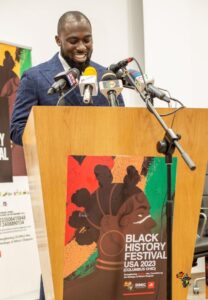
 Currently he is the founder/CEO of Young Africa Media Center and general manager of YALI TV, a fast-growing online television channel dedicated to tell the stories and impacts of YALI Alumni and young leaders across Africa. He leads over a 100 YALI TV Correspondents and associates across Africa, and the channel has covered major events on the continent in English, Portuguese and French. He is also the coordinator of the Black History Festivals which began in 2022. The 2023 Black History Festival will take place in Columbus Ohio.
Currently he is the founder/CEO of Young Africa Media Center and general manager of YALI TV, a fast-growing online television channel dedicated to tell the stories and impacts of YALI Alumni and young leaders across Africa. He leads over a 100 YALI TV Correspondents and associates across Africa, and the channel has covered major events on the continent in English, Portuguese and French. He is also the coordinator of the Black History Festivals which began in 2022. The 2023 Black History Festival will take place in Columbus Ohio. 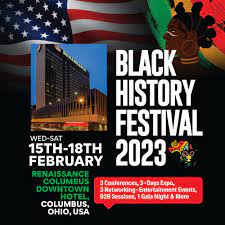 As he continues to develop content best in value-based leadership, Stephen aspires to be a renowned Media Entrepreneur and Development Communication Consultant in Ghana. Steven hopes to transform the socioeconomic fortunes of the continent through a renewed media vision for Africa through leadership, storytelling and peer partnerships.
As he continues to develop content best in value-based leadership, Stephen aspires to be a renowned Media Entrepreneur and Development Communication Consultant in Ghana. Steven hopes to transform the socioeconomic fortunes of the continent through a renewed media vision for Africa through leadership, storytelling and peer partnerships.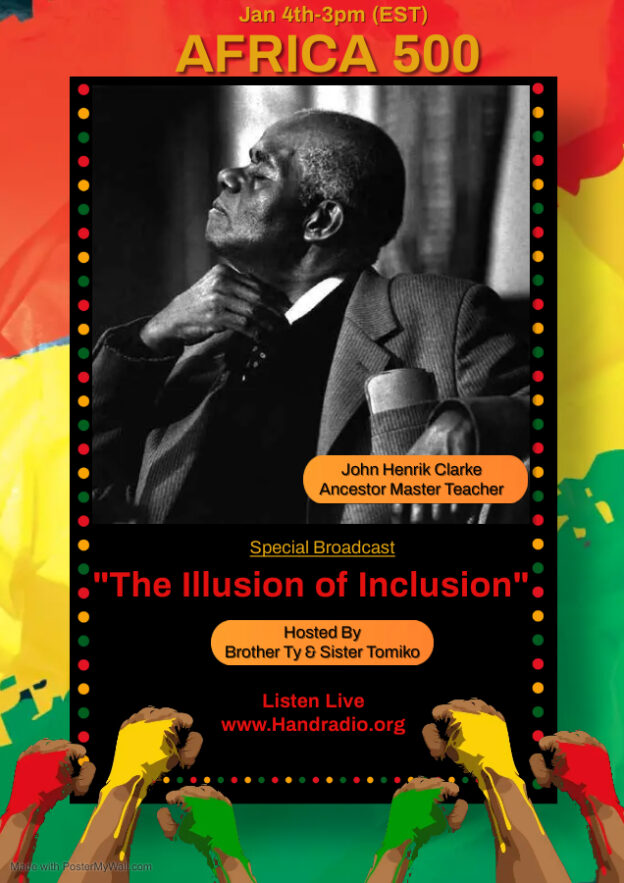
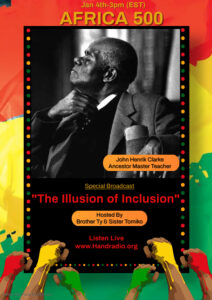 Starting in January 2023, Africa400 is now renamed
Starting in January 2023, Africa400 is now renamed 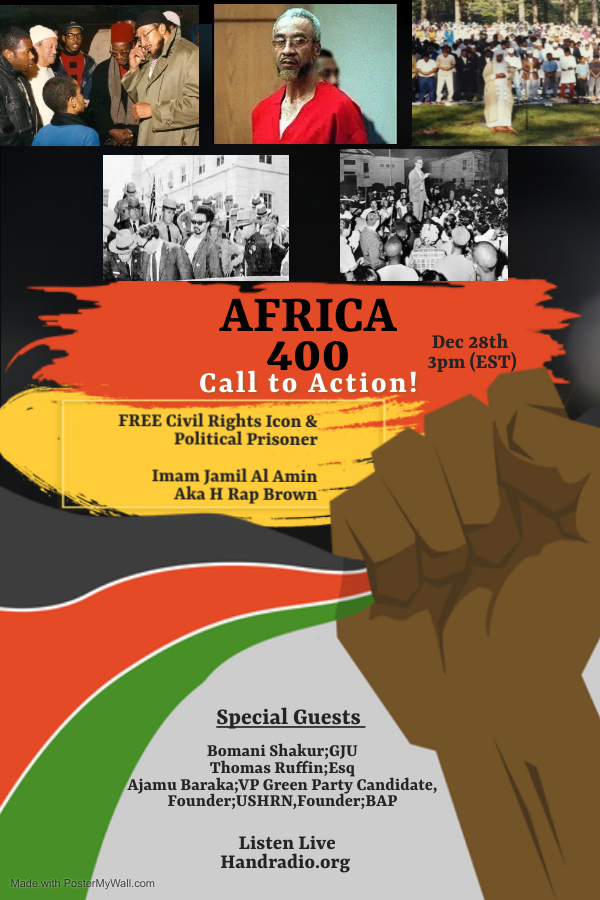
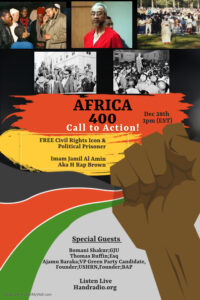 The Wednesday, December 28, 2022 edition of Africa400 discusses the case of Political Prisoner Imam Jamil Al-Amin and the actions that must be taken to secure his exoneration and freedom. Show Hosts Sis. Tomiko and Bro. Ty welcome the following powerful guests:
The Wednesday, December 28, 2022 edition of Africa400 discusses the case of Political Prisoner Imam Jamil Al-Amin and the actions that must be taken to secure his exoneration and freedom. Show Hosts Sis. Tomiko and Bro. Ty welcome the following powerful guests: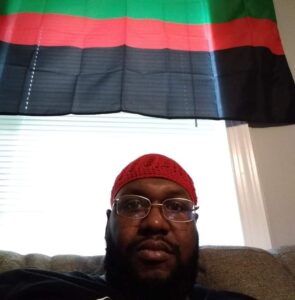 Bomani Uhuru Jihad Shakur is the National Minister of Information of The Provisional Government of The Republic of New Afrika (PG-RNA). He has been a Conscious New Afrikan Citizen since 2002. Serving in various capacities within the PG including Deputy Minister of Youth, Minister of Information, New Afrikan Nation Day Planning Committee and Co-Host of the Provisional Government of The Republic of New Afrika Radio Show. Locally he is the Minister of Information of the People’s Party for Independence (PPI) in the New Afrikan Population District of Baba Dr. John Henrik Clarke Town aka Columbus, Georgia. Brother Bomani is a local representative of IJAN (Imam Jamil Action Network). Minister Bomani is Vice Chancellor of George Jackson University (GJU), Host of George Jackson University Radio and Acting Spokesperson for George Jackson University. Bomani Uhuru Jihad Shakur is an active member of BAOC (Black August Organizing Committee). Bomani is a member of the Re-Build Newspaper Distribution Collective. Aside from his local activities and national kazi, he is a New Afrikan Propagandist, New Afrikan Ourstorian [“It’s Our Story not his story (history)”], Educator, Activist, Advocate of Captured New Afrikan Citizens (i.e. New Afrikan Political Prisoners), New Afrikan Prisoners of War as well as political prisoners of other movements such as the Black Liberation Movement. Comrade Bomani is committed to presenting ourstorical narrative via radio, literature, written correspondence and conversation.
Bomani Uhuru Jihad Shakur is the National Minister of Information of The Provisional Government of The Republic of New Afrika (PG-RNA). He has been a Conscious New Afrikan Citizen since 2002. Serving in various capacities within the PG including Deputy Minister of Youth, Minister of Information, New Afrikan Nation Day Planning Committee and Co-Host of the Provisional Government of The Republic of New Afrika Radio Show. Locally he is the Minister of Information of the People’s Party for Independence (PPI) in the New Afrikan Population District of Baba Dr. John Henrik Clarke Town aka Columbus, Georgia. Brother Bomani is a local representative of IJAN (Imam Jamil Action Network). Minister Bomani is Vice Chancellor of George Jackson University (GJU), Host of George Jackson University Radio and Acting Spokesperson for George Jackson University. Bomani Uhuru Jihad Shakur is an active member of BAOC (Black August Organizing Committee). Bomani is a member of the Re-Build Newspaper Distribution Collective. Aside from his local activities and national kazi, he is a New Afrikan Propagandist, New Afrikan Ourstorian [“It’s Our Story not his story (history)”], Educator, Activist, Advocate of Captured New Afrikan Citizens (i.e. New Afrikan Political Prisoners), New Afrikan Prisoners of War as well as political prisoners of other movements such as the Black Liberation Movement. Comrade Bomani is committed to presenting ourstorical narrative via radio, literature, written correspondence and conversation.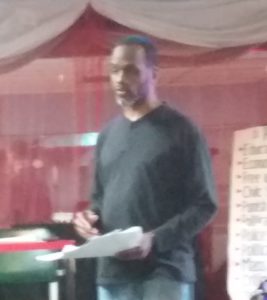 Thomas Ruffin is a founding member of the International Association of Black Lawyers, a group of highly competent, radical Black lawyers who came together in 2017 for the liberation and uplift of Black people and the poor throughout the world. As a lawyer, Thomas Ruffin practices in the United States, principally in the District of Columbia and Maryland. As an activist, Thomas Ruffin fights against injustice anywhere. Indeed, Mr. Ruffin served as the public information lawyer in the campaign to free Troy Anthony Davis, a Black man wrongfully executed by the racist state of Georgia in September 2011. Thomas Ruffin also served as a member of the Jericho National Movement, a nonprofit organization that aimed to liberate political prisoners held captive in the United States.
Thomas Ruffin is a founding member of the International Association of Black Lawyers, a group of highly competent, radical Black lawyers who came together in 2017 for the liberation and uplift of Black people and the poor throughout the world. As a lawyer, Thomas Ruffin practices in the United States, principally in the District of Columbia and Maryland. As an activist, Thomas Ruffin fights against injustice anywhere. Indeed, Mr. Ruffin served as the public information lawyer in the campaign to free Troy Anthony Davis, a Black man wrongfully executed by the racist state of Georgia in September 2011. Thomas Ruffin also served as a member of the Jericho National Movement, a nonprofit organization that aimed to liberate political prisoners held captive in the United States.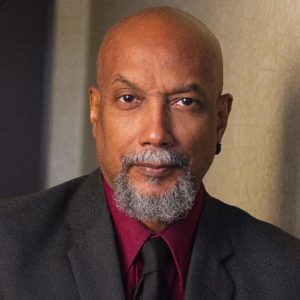 A human rights defender whose experience spans four decades of domestic and international education and activism, Ajamu Baraka is a veteran grassroots organizer whose roots are in the Black Liberation Movement and anti-apartheid and Central American solidarity struggles.
A human rights defender whose experience spans four decades of domestic and international education and activism, Ajamu Baraka is a veteran grassroots organizer whose roots are in the Black Liberation Movement and anti-apartheid and Central American solidarity struggles.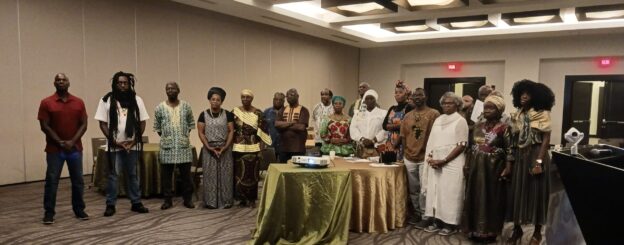
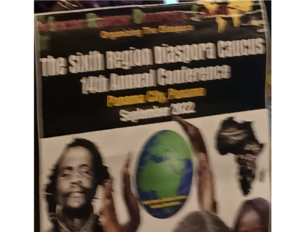 The 2022 SRDC Summit was held from Thursday, September 22 through Sunday, September 25, 2022 in Panama City, Panama. Since SRDC does not yet have an organization in Panama, this amounted to “virgin territory” for our organizing efforts. A number of the hoped-for attendees were not able to secure travel visas to attend the Summit in time, but some of them were afforded the opportunity to connect to the Summit virtually via Zoom. Activists from the Virgin Islands, Costa Rica, The Netherlands, Liberia, the United States and, of course, the host country of Panama were in attendance, with others from the United States, Tanzania, Ghana, Guadeloupe and other locations connecting virtually.
The 2022 SRDC Summit was held from Thursday, September 22 through Sunday, September 25, 2022 in Panama City, Panama. Since SRDC does not yet have an organization in Panama, this amounted to “virgin territory” for our organizing efforts. A number of the hoped-for attendees were not able to secure travel visas to attend the Summit in time, but some of them were afforded the opportunity to connect to the Summit virtually via Zoom. Activists from the Virgin Islands, Costa Rica, The Netherlands, Liberia, the United States and, of course, the host country of Panama were in attendance, with others from the United States, Tanzania, Ghana, Guadeloupe and other locations connecting virtually.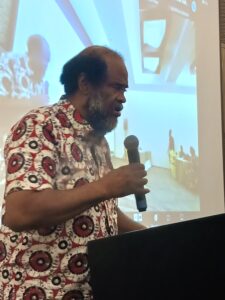
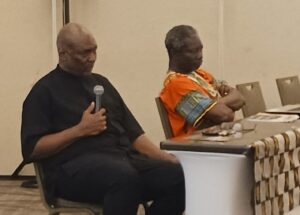
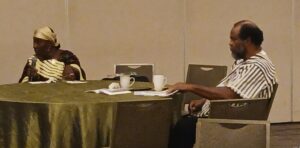
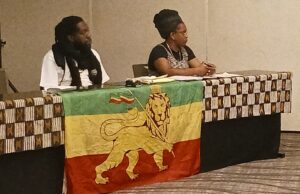
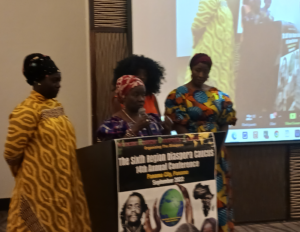
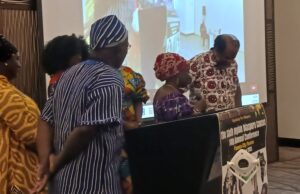
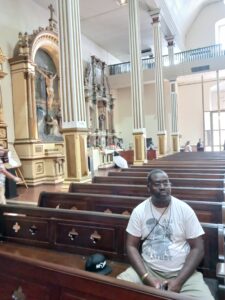
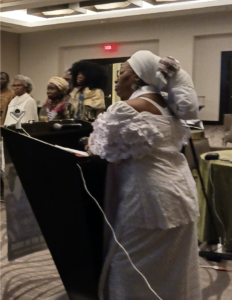
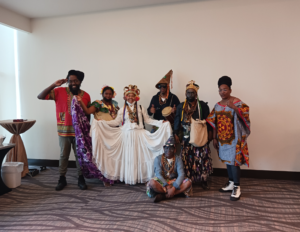

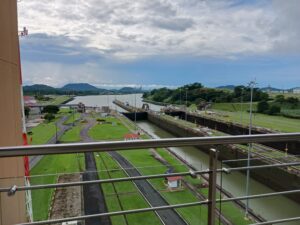
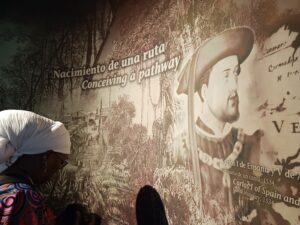
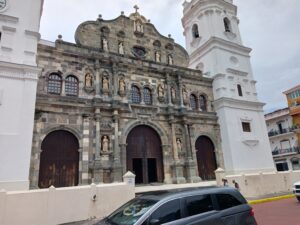
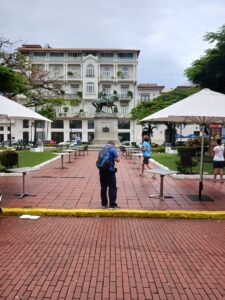
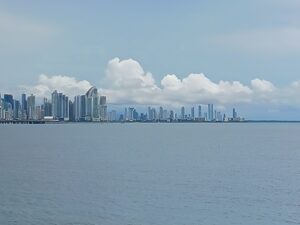
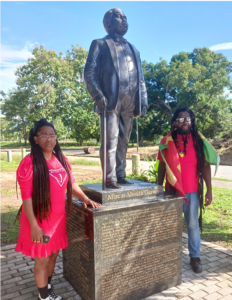
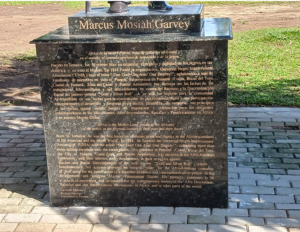
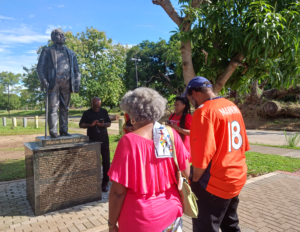
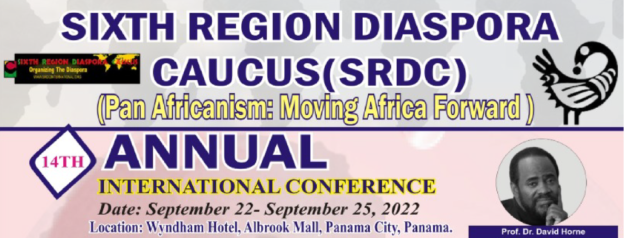
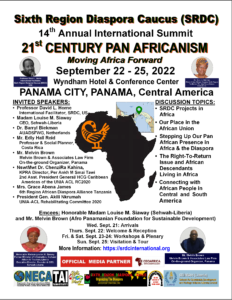 The 14th Annual International Summit of the Sixth Region Diaspora Caucus (SRDC) will be held from September 22 – 25 in Panama City, Panama.
The 14th Annual International Summit of the Sixth Region Diaspora Caucus (SRDC) will be held from September 22 – 25 in Panama City, Panama.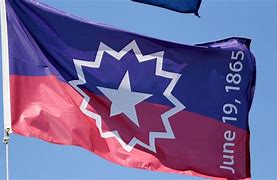
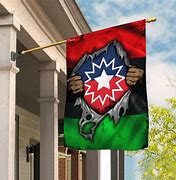 There are several observances being held across the state of Maryland. Thanks to Baba Lou Fields for hosting a brief Zoom call on the afternoon of Tuesday, June 14 that featured several guests who were announcing their Juneteenth events. We’re including contact information (details can be found on the event Web sites and by contacting the organizations by email or phone when made available) on just a few of these Juneteenth celebrations taking place this weekend across the state of Maryland:
There are several observances being held across the state of Maryland. Thanks to Baba Lou Fields for hosting a brief Zoom call on the afternoon of Tuesday, June 14 that featured several guests who were announcing their Juneteenth events. We’re including contact information (details can be found on the event Web sites and by contacting the organizations by email or phone when made available) on just a few of these Juneteenth celebrations taking place this weekend across the state of Maryland: NAACP 2nd Juneteenth Celebration
NAACP 2nd Juneteenth Celebration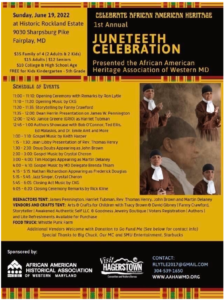 African American Historical Association
African American Historical Association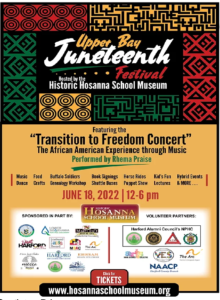 Upper Bay Juneteenth Festival
Upper Bay Juneteenth Festival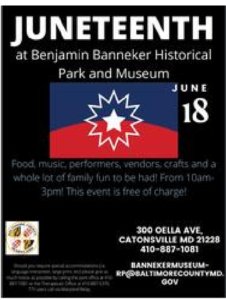 Benjamin Banneker Historical Museum and Park
Benjamin Banneker Historical Museum and Park Annapolis Juneteenth Celebration
Annapolis Juneteenth Celebration Plantation Park Heights Urban Farm
Plantation Park Heights Urban Farm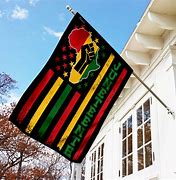

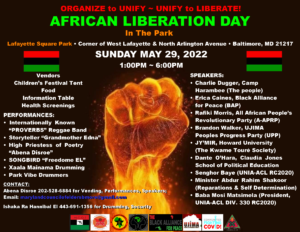 The Maryland Council of Elders (MCOE), All-African People’s Revolutionary Party (A-APRP), All African Women’s Revolutionary Union (A-AWRU), Ujima People’s Progress Party (UPP), Black Alliance for Peace (BAP), Woodson Banneker Bey Division 330 of the UNIA-ACL RC2020 and Pan-Afrikan activists from across the Maryland-Washington, DC area will converge on Lafayette Square Park in West Baltimore (West Lafayette and North Arlington Avenues) for an observance of African Liberation Day on Sunday, May 29 from 1:00 – 6:00 PM.
The Maryland Council of Elders (MCOE), All-African People’s Revolutionary Party (A-APRP), All African Women’s Revolutionary Union (A-AWRU), Ujima People’s Progress Party (UPP), Black Alliance for Peace (BAP), Woodson Banneker Bey Division 330 of the UNIA-ACL RC2020 and Pan-Afrikan activists from across the Maryland-Washington, DC area will converge on Lafayette Square Park in West Baltimore (West Lafayette and North Arlington Avenues) for an observance of African Liberation Day on Sunday, May 29 from 1:00 – 6:00 PM.